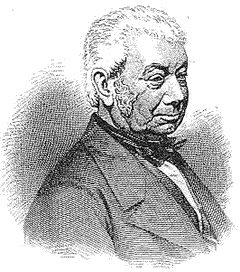Joseph Livesey,
the poor people’s friend
Joseph Livesey: the Walton weaver

The city of Preston has been ‘first’ on several occasions: first public telephone boxes, first public gas lighting outside London, first professional team in the Football League and… the first Kentucky Fried Chicken shop opened here. Institutions had their roots here, too. The Mormon Church, now powerful and influential in America, started here. Preston has seen quite a few famous folk and they are commemorated on blue plaques and in the organisations they left behind. None more so than Preston’s famous son, Joseph Livesey and his Temperance Movement.
Born in Walton-le-Dale in 1794 and orphaned at the age of seven, Joseph Livesey grew up with his grandparents and followed his grandfather’s trade of hand loom weaving. In his early life he knew poverty and privation and so empathised with the poor and needy. He was raised as a Baptist but felt constrained by what he considered to be “the narrow bounds of sectarianism”. He saw himself as a Christian activist and he closely studied the New Testament and tried to base his life on the teachings of Jesus Christ. He was inspired by verses such as “Bear ye one another’s burden and so fulfil the law of Christ”.
He was a shrewd business man and his transformation from hand loom weaver to cheese factor came about when he purchased two cheeses from a farmer on Preston Market and then sold them in portions from a stall near the end of Stoneygate. By undercutting the farmers at the Market, he very soon became one of the most affluent cheese factors in the county. Prosperity, however, did not affect his concern for those who needed help. He believed in offering practical assistance to those needing it and with this in mind, he formed a ‘Labour Association’ (in reality, a job creation project). In 1847 when unemployment was high, he assisted in the creation of a scheme to repair the footpath which ran along the northern reaches of the River Ribble. When the Cotton Famine bit in Preston, Livesey was there with associates, forming a Relief Committee. While some folk talked about the social problems, Livesey ‘did’ something about them.
He was also prepared to visit the poor, not only in Preston, but in all the towns and villages he visited. He felt very strongly about workhouses and the Poor Law Amendment Act and the human tragedies thus caused. In his travels around Preston and other places, wherever his cheeses took him, he observed that much of the squalor and distress experienced by the poor stemmed from alcohol abuse. He set up his Temperance Movement in Preston in March 1832 and spent the rest of his long life crusading against the evils of drink. It was his belief that drinking in moderation (as recommended by society and the medical profession) often led to drunkenness and dependence upon alcohol. Only total abstinence was acceptable and his followers were called upon to sign a pledge promising to abstain from alcoholic beverages.
It was one of his followers, Richard Turner, who coined one of the most famous words to be connected with the Temperance Movement. A reformed drinker and ardent follower, he was one day fervently advocating total abstinence when he is said to have stuttered over the word total. The result “t-t-t-total” was picked up by Livesey and very soon came into the language and the word TEETOTAL has appeared in every English dictionary since that time.
The ideals of the Temperance Movement were embraced by several nonconformist churches and are still adhered to today. Joseph Livesey called those who had signed the pledge “the great army of Temperance”. His disciple Dicky Turner observed, “When I go through the streets on Sunday, it does my soul good to meet so many reformed drunkards well-dressed and going to their places of worship”.
Livesey’s contribution to society was not exclusive to Temperance and the poor. He was a prolific writer and never missed an opportunity to attack the Establishment whenever he felt that it was needed. The Corn Laws had allowed the rich to prosper and the poor to sink further into poverty. Livesey was an ardent supporter of the campaign for the repeal of the laws and in 1844 he went into journalism in a big way and launched the “Preston Guardian”. His newspaper was a vehicle to attack the government and also to promote his temperance ideals.
He was a passionate believer in education. He and his wife Jane ran a Sunday School for many years teaching not only religion and the Bible but the basic tools of learning – reading and writing. He was also concerned with the education of adults and, along with many others, he felt that Preston ought to have a Mechanics Institute. Being Livesey, he did not allow the grass to grow under his feet and he set about establishing one at 21, Cannon Street in 1828.
By 1841 it had outgrown the building and a new home was built in Avenham Walk. Known, among other titles, as the Avenham Institute, it in turn became the Harris Institute. Out of the Mechanics Institutes, the Public Library Movement was born, but that is another story.
He died in 1884 aged ninety. Ten thousand people lined the streets on the day of his funeral. Flags were flown at half-mast from public buildings and the blinds were drawn in almost every house from 13, Bank Parade in Avenham to the Cemetery. His epitaph states that “he died in his ninety-first year after an honoured life of philanthropy and usefulness as author and worker, as the pioneer of temperance, the advocate of moral and social reform and the helper and friend of the poor”. Some epitaph, indeed!
Perhaps today, ‘signing the pledge’ and ‘teetotalism’ are seen in many quarters as old fashioned and narrow. It has to be said, however, that in the hundred and twenty years or so since Livesey died, not a lot has changed. Alcoholism still blights lives and causes misery.
“Alcoholics Anonymous” would have no difficulties at all with Joseph’s aims and beliefs. One might say that they are carrying on where he left off.
Barbara Hothersall
Related content: Joseph Livesey: the Walton weaver
Joseph Livesey’s Autobiography
In his autobiography Joseph Livesey constructed a flattering image of himself, writing a typical Victorian rags to riches story, but one that accentuated the rags and played down the riches. His self-canonisation as a secular saint has been accepted ever since. Hagiography has trumped history. Yet his account does not stand up to close scrutiny as this introduction aims to show.
